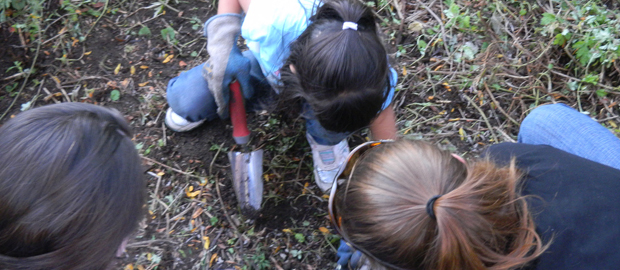Students teach healthy habits to next generation
Partnering with Healthy Waltham, they 'grow gardeners'

Students work in gardens they created with Healthy Waltham.
When folks at Healthy Waltham talk about their passion, they tend to speak in puns.
The civic group is dedicated to improving quality of life for those who live, work and learn in Waltham. It is a small, homegrown organization that relies heavily on local voluntarism, and semester after semester, many of those helping hands belong to Brandeis students.
“I would really love to be growing gardeners,” says Executive Director Judy Fallows, who often shares with students her passion for teaching the community to grow its own food. “Brandeis is working on getting students out into the real world and we love to have Brandeis students come out to the real world.”
Fallows says Brandeisians have interned and volunteered with the organization every semester since she got involved in 2006.
In one sense, growing gardeners is exactly what Healthy Waltham and Brandeis have been doing together.
It was in Professor Laura Goldin’s “Greening the Ivory Tower” course in 2008 that the idea for students to create new gardens was born. A visit from Fallows inspired a few students to lend a hand in the community by marrying their interest in the environment and fondness for children.
For Mariah Rich ’10, it was a perfect match. By coincidence, Fallows had been her science teacher in elementary school, where there was also a garden. Rich recalls “going to the garden and tasting fresh strawberries” as one of the most exciting experiences of her childhood.
Healthy Waltham, which is supported by the Mass Department of Public Health and Mount Auburn Hospital among other organizations, already was running a couple of public school gardens, but Brandeis students wanted to start a new one – at the Stanley School just off campus – where they were volunteering with the after-school program.
“We wanted them to taste what it’s like to grow something fresh, to grow something organically, to grow something from the ground,” Rich says, “and see the fruits of their labors.”
Rich and a couple of classmates spent a few days a week for several months “doing pretty intense labor,” clearing the land of weeds and bringing in fresh soil before what became fall internships even began.
Once both Brandeis and the Stanley School were back in full swing, the Brandeisians ran a garden club twice a week, doing a variety of activities with the children from bringing in worm bins and teaching them about composting to helping them identify the parts of plants and creating nutrition-related crafts projects.
“We were really just trying to grow their awareness any way we could,” Rich says of the Stanley School children.
Fallows could as easily say the same of the Brandeis students. Rich continued working with the kids by becoming an employee of the after-school program, and later returned to Healthy Waltham as a Schweitzer Fellow, which aims to improve health and human services. This summer, she hopes to become a member of the organization’s board of directors.
“My overarching passionate vision is to have food growing all over the place,” Fallows says.
That’s why it’s a win for all involved when Brandeis students intern or volunteer, she says. Beyond working at the school gardens, Brandeisians have partnered with Healthy Waltham in a variety of ways. Through Goldin’s environmental courses, Justice Brandeis Semesters or the Waltham Group, a student-led community service organization, students have put together a healthy snack cookbook, created gardens at low-income housing sites, written blog posts for their website or articles about Healthy Waltham for local newspapers, conducted practicums, led site cleanup projects and run cooking sessions at the Boys & Girls Club. The organization’s first garden coordinator, a part-time staff position, was a Brandeis student.
“Healthy Waltham is a tiny little organization without a lot of funding, and having Brandeis students help us extend our reach into the community and bring a young face to some of what we’re trying to do and develop relationships with kids is a really big benefit for us,” Fallows says. “Especially with their social justice and health and environment interests, it’s a really big benefit to the students, because we also interact with a lot of other organizations and they love the idea of school work also being real work.
“There have been some lovely experiences on both ends,” Fallows says. “Maybe we can grow some gardeners.”
Categories: Humanities and Social Sciences, Student Life





